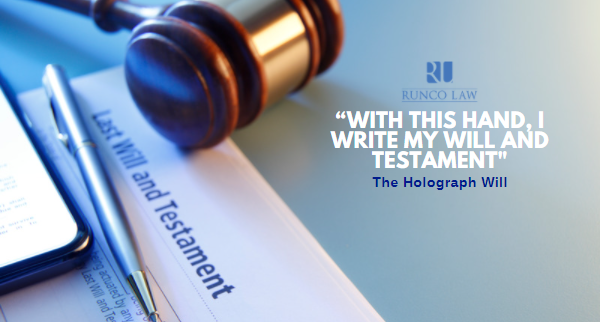Introduction
As the world watches the terror unfold in the Ukraine, our hearts ache for those brave citizens who remain in the homeland to fight against the tyranny of evil of the Russian invasion. It is a sad but realistic expectation that some of them will not survive the conflict. This is all too common in warfare.
As Canadians, we are fortunate to not be directly involved in the situation. But for many of us, the thought of going to war or to act in a peace-keeping role is not a distant memory. This is why the law in Canada has allowed soldiers who will put themselves in the middle of an international dispute to make the necessary final arrangements for their own demise, as there is a real possibility that they may never return to our shores. They may hand-write their wills, to allow them to express in writing their final thoughts, desires, and intentions for their legal affairs.
This blog will address the topic of “the holograph wills” in Ontario. I will discuss who can write such a will, what must form part of the document, and what could undo someone’s best intentions in doing such a will.
What is a Holograph Will?
A holograph will (also known as a “holographic” will) is a will that is drafted by a person solely in their own handwriting. The word “holograph” is derived from the Greek word “olographo,” which means “entirely hand-written.”
Who Can Make a Holograph Will?
Generally speaking, in Ontario, a person can make a will if they meet all 3 of the following criteria:
- The person must be 18 years of age or older (some exceptions exist for those in Canadian Armed Forcers or a sailor at sea);
- The person must be of sound mind at the time of giving instructions to make a will and at the time of execution; and,
- The person must not be under any undue influence or coercion at the time of giving instructions to make a will and at the time of execution.
What Law governs the Making of a Holograph Will?
In Ontario, the legality of the holograph is provided for in section 6 of the Succession Law Reform (“the SLRA”), which states:
“A testator may make a valid will wholly by his or her own handwriting and signature, without formality, and without the presence, attestation or signature of a witness.”
A “testator” is the person who writes their own will. From this simple statement, we see that, to be considered a valid holograph will, the document must contain 3 essential components:
- The testator, and no one else, is the person who has written the will;
- The will must be wholly in the testator’s own handwriting, i.e. no part of the document can be typed or pre-printed; and,
- The testator, and no one else, must sign or formally witness the will.
Why Do a Handmade Will?
At this point, you may ask yourself, “Why does someone want to do a handwritten will?” The reasons are generally broken down into one of three reasons:
- The person wants to save the cost of hiring a lawyer to draft a will, or even preparing a do-it-yourself will kit (they want to “keep it simple”);
- The person does not want others to know that they have done a will, whether that be a new romantic partner, a former romantic partner, or their immediate family (they want to be “secretive” or “protective”); or,
- The person is or will be in life-threatening circumstances that they do not have the ability (or desire) to do a will with the help of a lawyer or via self-help, such as being diagnosed with a fatal illness, traveling alone, going to war, or are otherwise are expecting their life to come to a very quick end (they want to be “realistic,” in the face of difficult circumstances).
Common Mistakes in Drafting Holograph Wills
So far, so good. Seems easy enough, right? Actually, it is, but as a lawyer, I have seen many common mistakes when a person decides to prepare a holograph will. These include, but is not limited to:
- The person gets someone to hand-write the will for them;
- The person use part of a “do-it-yourself” will-kit to draft the will, so the document is partially pre-printed and hand-written;
- The person does not sign it:
- The person gets people to witness it:
- The will is undated, and there is no ability to know whether it is the testator’s last will:
- The will itself is too vague in its instructions.
Being of Sound Mind: Testamentary Capacity
Let’s assume, for a moment, that the holograph meets all the requisite criteria and, on its face, appears to be valid. The question that usually surfaces next is whether the will-maker of sound mind at the time they handwrote the will. For lawyers, we ask the following legal question (the legal test): Did the person have the “testamentary capacity” when they wrote the holograph will?
It is settled Canadian law that a person had testamentary capacity if they had a “sound disposing mind.” In turn, to have a “sound disposing mind,” the person must meet the following criteria:
- They understand the nature and effect of a will:
- Does the person make any reference surrounding their impending death?
- Does the person call the document their “last will and testament?”
- Does the person appoint someone to handle their affairs once they are dead?
- Does the person provide instructions as to what should be done with their property?
- Please note that the person making the holograph will does not need to use the common legal words that lawyers use in will drafting to give effect to their holograph will. In other words, there’s no need to see words like “testator,” “executor,” “devise”, or “bequeath” in the document.
- They recollect the nature and extent of their property:
- Does the person make general reference to their property, e.g. “everything I own?”
- Does the person make specific reference to their assets?
- Does the person omit reference to any specific yet significant assets?
- Does the person differentiate between different assets (e.g. personal property vs. real property)
- Does the person reference property addressed in a previous will that they now want handled differently in the holograph will?
- They understand the extent of what they are giving under the will:
- Once again, does the person make general vs. specific references to how they are disposing of their property? e.g. “everything I own” to my wife vs. my house to wife, my money to children, my golf clubs to my best friend, John Doe
- Do the assets they are giving away actually belong to them at the time they are making the will? e.g. the house that my partner and I bought in 2020 vs. our first house from 1982 goes to my granddaughter (long since sold), or my Nintendo 64 console to my grandson and games (long since disposed of)
- Do the assets they are giving away actually belong to them? e.g. $5,000 in my CIBC account goes to my brother vs. my intertest in Casa Loma goes to my children
- They remember the people that might be expected to benefit under the will:
- Are the people that are beneficiaries under the holograph will the same people who would be expected to be beneficiaries under a regular will?
e.g. I leave my house to my wife vs. I leave my house to my nice neighbour, John Jones, who cleared my snow last year when I could not do so?
e.g. I leave all of my money to my children vs. I leave all of my money to my cat, Mr. Whiskers, who kept me company when my children didn’t
- Are there people named who are expressly cut out of the will? e.g. I ask my sister, Jane Doe, to make sure that my ex-wife, Jill Smith-Doe, gets nothing since we separated in 2020
- Where applicable, they understand the nature of the claims that may be made by people they are excluding under the will:
- Is there an explanation as to why a person or people are excluded from the will?
e.g. I ask my sister, Jane Doe, to make sure that my ex-wife, Jill Smith-Doe, gets nothing since we separated in 2020 vs. I don’t want my wife, Jill Smith-Doe, to get anything because her parents are rich anyway.
e.g. My children will not get anything as they are independent adults and no longer need my financial help vs. Please make sure that neither of my teenage children get anything because they are both ungrateful spoiled brats, and I don’t want my hard-earned money wasted on them!
Challenging the Holograph Will
Sometimes, I will get a call from a prospective client to review their holograph will. I always refuse. It is my policy, and always has been, that if you want me to review your homemade will, it will cost you the same as me drafting a fresh will properly.
In most cases, though, it is usually only when the person has died that either the purported executor (the person who will handle the deceased’s affairs) or the deceased’s family will bring me the holograph will (or a copy of it). They usually ask me if the purported will is valid, or if there is a way to attack the purported will (their motivation usually flows from whether they will benefit, or not, under the terms of a purported holograph will).
In any event, there are several ways to challenge the will (again, not an exhaustive list):
- Are there technical deficiencies? e.g. the will is not entirely in a person’s own handwriting
- Are there legal deficiencies? e.g. the hand-writing cannot be proven to be the testator’s handwriting
- Did the person writing the will have testamentary capacity? e.g. the person was not of sound mind at the time the will was written
- Is there any indication that the person who wrote the will was under duress or undue influence at the time they wrote it? e.g. does the purported holograph will dispose of assets in an unusual or suspicious manner, does it give all of one’s property to “someone new in the picture,” is it substantially different from a recently “lawyer-drafted” will, or it does not sound anything like what the testator would do or say
- Is there any concern that the person who wrote the will was under the influence of alcohol or drug to such extent that it impaired them to not be of sound mind? e.g. Is it clear that at the time they wrote it, the person was under the influence, by the words they used, the spelling, the grammar, the quality of the writing itself, etc.
(Be careful, because being an alcoholic or a drug addict does not automatically invalidate a holographic will).
Conclusion
As you can see, what at first seems simple can easily devolve into something a lot more complex. As the current generation of baby boomers passes away and they give away the fortunes they have amassed, the stakes are very high for the people who stand to inherit (or be disinherited from) a lot of wealth. As I tell people, by saving a few dollars to not have the will properly be drafted, you can expect people to spend tens (if not hundreds) of thousands of dollars and years in a court battle for a judge to determine who is, and is not, a beneficiary under a holograph will. Spend a little now, so others don’t have to spend a lot later on.

